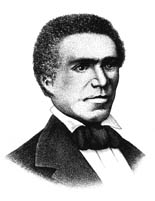Africana Studies Resources
John Brown Russwurm (Bowdoin Class of 1826)
Please note when the library recently updated our online catalogs, the links in our subject guides broke. We are working actively to fix this problem. In the meantime, you can search for materials referenced by consulting the library catalog and our catalog of archives and manuscript materials.
John Brown Russwurm (1799-1851), Bowdoin College's first African American graduate, was the third African -American graduated from an American college. He was born in Port Antonio, Jamaica, the illegitimate son of a white planter and a black slave. His father, John Russwurm, belonged to a wealthy Virginia family and had gone to Jamaica after completing his education in England. When John Brown Russwurm was eight years old, he was sent to Quebec to receive a proper education. Soon after, the elder Russwurm moved to Maine and married Susan Blanchard. Young Russwurm then came to live with his father's family, where he was accepted by his step-mother as one of her own. Russwurm stayed with the family even after his father's death, continuing his education at Hebron Academy in Hebron, Maine. His step-mother and her new husband helped him to enroll at Bowdoin in 1824.
Russwurm entered Bowdoin at the age of twenty-five, and not much is known of the two years he spent in Brunswick. Charles Calhoun notes in A Small College in Maine: Two Hundred Years of Bowdoin (Brunswick, Me.: Bowdoin College, 1993) that Russwurm passed “a somewhat lonely two years in college, though he was well-enough accepted by his fellow students to be elected to the Athenaean Society” (one of two competing popular campus literary groups). Horatio Bridge, Class of 1825 and a lifelong friend of Nathaniel Hawthorne, recalls Russwurm this way in Bridge's Personal Recollections of Nathaniel Hawthorne (N.Y.: Harper & Brothers, 1893, p. 30):
[He] was a diligent student, but of no marked ability. He lived in a carpenter's house, just beyond the village limits, where Hawthorne and the writer called upon him several times, but his sensitiveness on account of his color prevented him from returning the calls. Twenty years later I renewed the acquaintance pleasantly in Africa, where – as Governor of Cape Palmas – he received, with dignity and ease, the Commodore and officers of our squadron, myself all the more cordially because we had been college associates and fellow Athenaeans.
Throughout much of the nineteenth century, Bowdoin's graduating seniors were expected to compose and deliver a commencement part during the graduation ceremony. These parts were usually philosophical or literary disquisitions, and they were viewed by the degree candidates as an important stepping stone to their future careers. Emphasizing a theme he would return to throughout his life, Russwurm declaimed about the struggle for freedom by oppressed peoples by examining the potential for revolution in Haiti. His “part” was titled “The Conditions and Prospects of Hayti.”
Immediately after being awarded a Bachelor of Arts from Bowdoin, Russwurm accepted a teaching position at Primus Hall, a school for black children in Boston. Then, in 1827, he joined a group of free black men in New York City to found Freedom's Journal, the first newspaper in the United States owned and operated by African Americans. Russwurm was co-editor until September of that year, when he became the sole editor and shifted the newspaper's editorial stance away from abolitionism and instead began to promote the colonization movement. This change in antislavery posture cost the newspaper readers, and Freedom's Journal ceased publication in 1829.
Russwurm subsequently emigrated from New York to the American Colonization Society colony of Liberia, where he served as colonial secretary (1830-1834) and as editor of The Liberia Herald. He then joined the neighboring Maryland Society, which recognized the importance of black leadership in their colony and made him governor in 1836, a post he held until his death.

